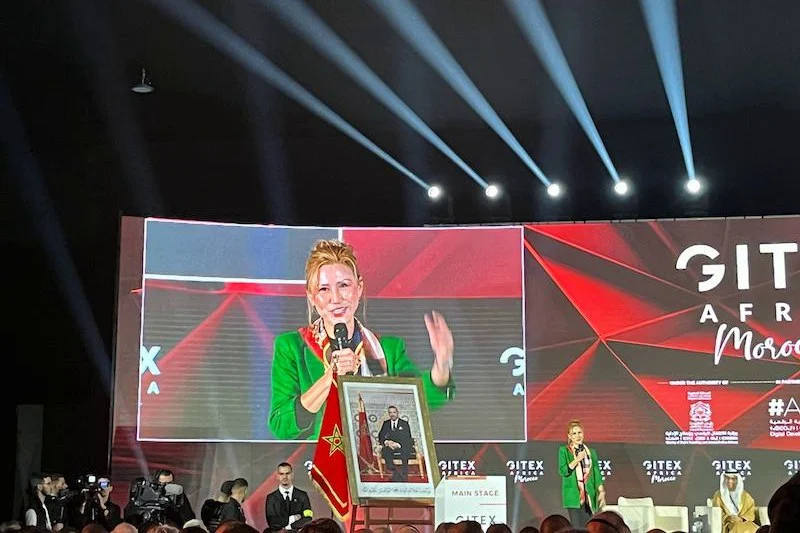During the launch of GITEX Africa 2025 in Marrakesh, prominent Moroccans and global leaders highlighted the significance of digital transformation and AI in defining the continent’s trajectory, simultaneously cautioning about increasing gaps in digital access and pressing concerns over cyber security risks.
The Minister Delegate for Digital Transition and Administrative Reform, Amal El Fallah Seghrouchni, highlighted that the digital economy currently accounts for 15% of worldwide GDP, amounting to $6.5 trillion. She emphasized that Morocco is dedicated to ensuring that digitization and artificial intelligence benefit every sector of society as they shape our future.
Echoing King Mohammed VI’s address to the African Union in 2018, she emphasized that Africa is well on track to emerging as a center for digital innovation.
Seghrouchni from El Fallah emphasized that approximately 40% of startups involved in this year’s event have incorporated AI technology. The worldwide Agentic AI market is anticipated to surpass $320 billion by the year 2030.
As 70% of large corporations intend to integrate AI agents over the next couple of years, she highlighted Africa’s demographic strength—its youthful, tech-savvy populace coupled with abundant crucial mineral resources—as a significant resource for developing AI frameworks.
Nevertheless, the Minister highlighted significant deficiencies as well: Africa accounts for under 1% of the world’s data center capacity, generates merely 0.5% of AI research papers, and lacks about 10 million skilled digital workers.
Moreover, 95% of AI training datasets do not include African languages and contexts. In reaction to this, she advocated for policies that would establish Africa’s role beyond just being a user but also as a creator of technology. Programs like “Morocco Digital for Sustainable Development” and institutions such as the “Jazari Institutes” are working towards fostering local innovation in the region.
Mohamed Drissi Melyani, who leads Morocco’s Digital Development Agency (ADD), supported this vision, emphasizing that GITEX Africa serves as an essential stage for advancing digital integration throughout Africa. He stated that the exhibition showcases Morocco’s commitment to establishing a robust digital economy focused on enhancing administrative effectiveness, fostering business expansion, and driving social progress.
The current event includes more than 1,500 exhibitors, 800 startup companies, representatives from 130 countries worldwide, along with participation from 350 investors. Melyani emphasized that promoting domestic innovations is at the core of this gathering, notably within sectors such as artificial intelligence, cyber security, financial technology, and electronic governance.
He highlighted the importance of digital instruments in getting Morocco ready for co-hosting the 2030 FIFA World Cup, presenting “SportTech” as a key area to boost the nation’s sporting environment and digital framework.
Mohamed Al Kuwaiti, who leads cybersecurity efforts for the UAE government, emphasized the critical need to invest in artificial intelligence to address escalating cyber threats. During his speech at the event, he highlighted that cyber attacks in 2024 resulted in billions of dollars in damages, and projected global expenditures on AI will exceed $300 billion by 2030.

Al Kuwaiti highlighted the importance of robust governance, stringent data protection measures, and extensive cooperation between public and private sectors to protect digital infrastructure.
He commended Morocco for its rising status as a global digital center, noting that its leadership has the potential to benefit not only Africa but also the entire globe.
Trixie LohMirmand, the CEO of Kaoun International and an organizer of the event, characterized GITEX Africa as a “convergence platform.” This platform unites startups, government entities, researchers, and investors with the aim of promoting collaboration and jointly developing solutions specifically designed for addressing Africa’s distinct challenges.
She praised the variety among the participants and highlighted how crucial women and young people are in propelling Africa’s digital revolution.
LohMirmand stressed that Africa’s digital advancement should be viewed as a collaborative effort rather than a contest, necessitating joint aspirations and solidarity to attain technological independence.
From April 14 to 16, as prominent participants gather in Marrakesh for GITEX Africa 2025, Morocco aims to establish itself as a central force behind Africa’s digital advancement—with innovation, inclusion, and cooperation serving as the foundational elements of this progression.
The post
Morocco leads the way in inclusive digital futures as GITEX Africa 2025 kicks off.
appeared first on
ecosundiaries.comEnglish – Morocco News
.